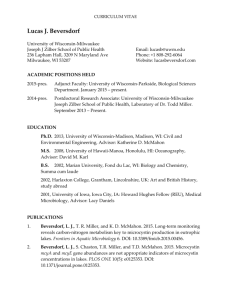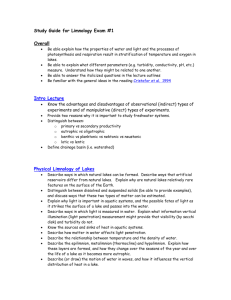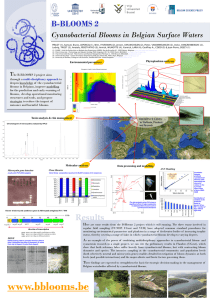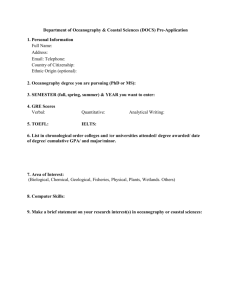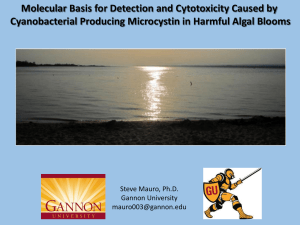Beversdorf_CurriculumVitae_20150115
advertisement
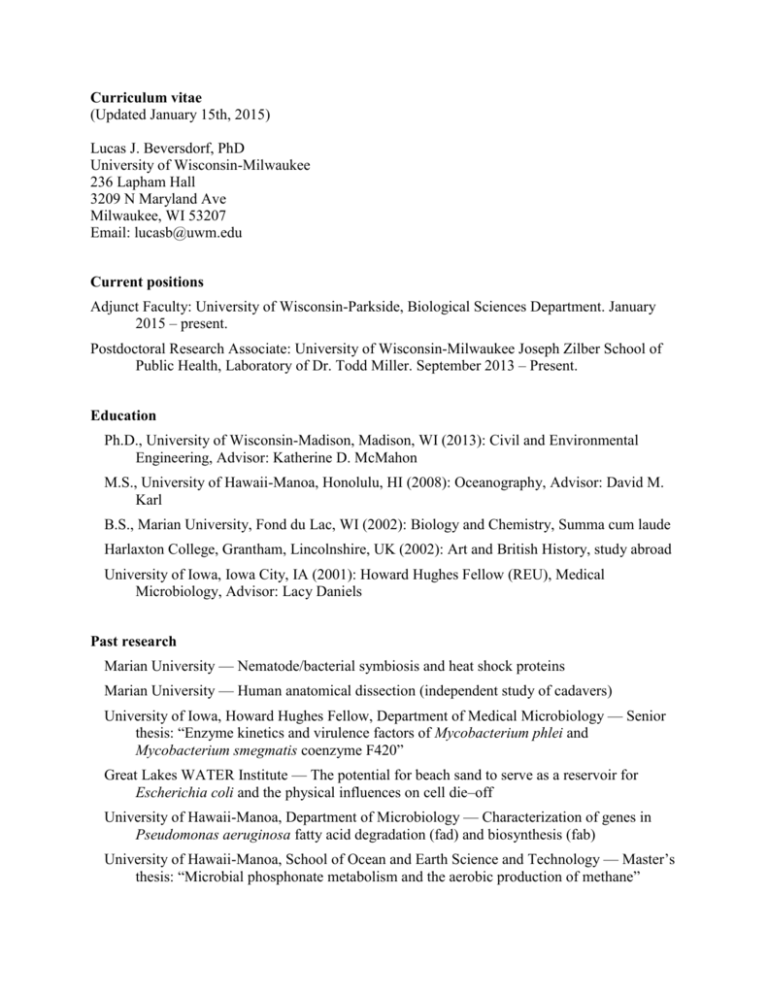
Curriculum vitae (Updated January 15th, 2015) Lucas J. Beversdorf, PhD University of Wisconsin-Milwaukee 236 Lapham Hall 3209 N Maryland Ave Milwaukee, WI 53207 Email: lucasb@uwm.edu Current positions Adjunct Faculty: University of Wisconsin-Parkside, Biological Sciences Department. January 2015 – present. Postdoctoral Research Associate: University of Wisconsin-Milwaukee Joseph Zilber School of Public Health, Laboratory of Dr. Todd Miller. September 2013 – Present. Education Ph.D., University of Wisconsin-Madison, Madison, WI (2013): Civil and Environmental Engineering, Advisor: Katherine D. McMahon M.S., University of Hawaii-Manoa, Honolulu, HI (2008): Oceanography, Advisor: David M. Karl B.S., Marian University, Fond du Lac, WI (2002): Biology and Chemistry, Summa cum laude Harlaxton College, Grantham, Lincolnshire, UK (2002): Art and British History, study abroad University of Iowa, Iowa City, IA (2001): Howard Hughes Fellow (REU), Medical Microbiology, Advisor: Lacy Daniels Past research Marian University — Nematode/bacterial symbiosis and heat shock proteins Marian University — Human anatomical dissection (independent study of cadavers) University of Iowa, Howard Hughes Fellow, Department of Medical Microbiology — Senior thesis: “Enzyme kinetics and virulence factors of Mycobacterium phlei and Mycobacterium smegmatis coenzyme F420” Great Lakes WATER Institute — The potential for beach sand to serve as a reservoir for Escherichia coli and the physical influences on cell die–off University of Hawaii-Manoa, Department of Microbiology — Characterization of genes in Pseudomonas aeruginosa fatty acid degradation (fad) and biosynthesis (fab) University of Hawaii-Manoa, School of Ocean and Earth Science and Technology — Master’s thesis: “Microbial phosphonate metabolism and the aerobic production of methane” Sapelo Island, GA — Interactions between Littoraria irrorata and Spartina: the role of fungal farming across contrasting landscapes of a saltmarsh Primorigen Biosciences, Madison, WI — Development of a multiplexed microarray for induced pluripotent stem cell biomarkers University of Wisconsin-Madison, Department of Civil and Environmental Engineering — PhD thesis: “Spatial and temporal variation in cyanobacterial population dynamics and microcystin production in eutrophic lakes” Oceanographic research cruises Hawaii Ocean Time–series (HOT) 1) Cruise 170: June12–17, 2005 2) Cruise 171: July 14–19, 2005 3) Cruise 172: August 11–16, 2005 4) Cruise 192: June 7–12, 2007 5) Cruise 193: July 5–10, 2007 6) Cruise 195: September 1–5, 2007 7) Cruise 196: October 1–5, 2007 Agouron Summer Course, University of Hawaii at Manoa 8) Cruise 1: July 4–10, 2006 Center for Microbial Oceanography Research and Education (C–MORE) 9) Bloom Ecological Reconnaissance (BloomER) Cruise: August 9–21, 2007 Teaching and outreach Adjunct Faculty, University of Wisconsin-Parkside Molecular Biology/Biostatistics 381 (Spring 2015) Molecular Biology 731 (Spring 2015) Mentor, Wisconsin Allegiance for Minority Participation (WiscAMP)(2014-present) Lead, Milwaukee Health Department Beach Monitoring Program (May 2014-present) Teaching assistant University of Hawaii-Manoa — Microbiology 140 (Spring 2005 and Fall 2005) University of Hawaii-Manoa — Agouron Summer Course in Microbial Oceanography Teaching outreach College for Kids Limnology Instructor (2011) Grandparent’s University Limnology Instructor (2010, 2011) Student Mentoring Past 1) Sam Matthews (2008-2009): Microbes in and under ice 2) Alex Binder (2008-2009): Microbes in and under ice 3) Brint Schwerbel (2009): Cyanobacterial culture experiments 4) Katie Waugh (2009): Cyanobacterial culture experiments 5) Rebecca Gilsdorf (2009-2010): Cyanobacterial community analysis 6) Samantha Reuter (2010): In situ N2 fixation 7) Matthew Marcott (2010): Cyanotoxins, in situ N2 fixation Professional societies American Society for Microbiology (ASM) American Society of Limnology and Oceanography (ASLO) American Geophysical Union (AGU) Ecological Society of America (ESA) Global Lake Ecological Observatory Network (GLEON) International Society for Microbial Ecology (ISME) Long Term Ecological Research (LTER) North American Lake Management Society (NALMS) Peer reviewer for Journal of Applied Microbiology Letters in Applied Microbiology FEMS Microbiology Ecology PLOS ONE Environmental Science and Research Pollution Awards Gordon Research Conference (2013), Mycotoxins and Phycotoxins Conference, Stonehill College, MA: Hot Topic Award and Best Poster Presentation University of Wisconsin–Madison — Biotechnology Training Program trainee (National Institutes of Health fellowship; $156,000) University of Wisconsin-Madison — Becker Travel Grants ($1500) University of Wisconsin-Madison — Anna Grant Birge Award ($1,550) University of Hawaii — Student Travel Award for Research (STAR; $1,500) University of Iowa — Howard Hughes Fellow ($3,600) Marian College — Presidential Scholar ($20,000) Marian College — Recipient of Dale R. Michels Memorial Scholarship ($6,000) Marian College — National Scholastic Honor Society (Delta Epsilon Sigma), Summa cum laude Select posters and presentations 1. American Society for Microbiology (ASM), Madison, WI (2005): Beach sand as a reservoir for Escherichia coli 2. University of Hawaii-Manoa, Microbial Grand Rounds (2006): Phosphonate metabolism and methane production in surface seawater 3. University of Hawaii-Manoa, STAR Symposium (2006): Phosphonate metabolism and methane production in surface seawater 4. American Society of Limnology and Oceanography (ASLO), Ocean Sciences Meeting, Orlando, FL (2008): Aerobic production of methane in the sea 5. Biogeochemistry Environmental Research Initiative (BERI), W. K. Kellogg Biological Station, Hickory Corners, MI (2009): Growth of cyanobacteria on synthetic herbicides as a phosphorus source 6. Raper Symposium, Madison, WI (2009): Cyanobacteria: four season microbes for one season graduate students 7. Global Lake Ecological Observatory Network (GLEON 9), Boulder Junction, WI (2009): Monitoring toxic cyanobacteria: from microcosms to buoycosms and modelcosms 8. American Society of Limnology and Oceanography (ASLO), Santa Fe, NM (2010): Monitoring toxic cyanobacteria: Integrating diverse disciplines for the development of predictive water quality tools 9. Global Lake Ecological Observatory Network (GLEON 11), Nanjing, China (2010): Nitrogen fixation structures cyanobacterial community composition in Lake Mendota, WI, USA 10. Ecological Society of America (ESA), Austin, TX (2011): Identifying linkages between the nitrogen cycle, cyanobacterial community structure, and cyanotoxin production in a eutrophic lake 11. Wisconsin Ecology 15th Annual Spring Symposium, Madison, WI (2012): Nitrogen drives harmful algal blooms in eutrophic lakes 12. International Society for Microbial Ecology (ISME 14), Copenhagen, Denmark (2012): The role of nitrogen limitation in shaping toxic cyanobacterial blooms in a temperate, eutrophic lake 13. Long Term Ecological Research All Scientists Meeting (LTER-ASM), Estes Park, CO (2012): Long term assessment of nitrogen cycling and harmful algal blooms in Lake Mendota, WI, USA 14. North American Lake Management Society (NALMS), Madison, WI (2012): Long term assessment of nitrogen cycling and harmful algal blooms in Lake Mendota, WI, USA 15. Gordon Research Conference (GRC), Mycotoxins and Phycotoxins, Stonehill College, MA (2013): Predicting toxic lakes: toward a more mechanistic understanding of cyanobacterial population dynamics and microcystin production 16. Oceans and Human Health Grantee Conference, Scripps Institution of Oceanography, La Jolla, CA (2014): Eliciting the ecological mechanism for microcystin production in eutrophic lakes 17. Global Lake Ecological Observatory Network (GLEON 16), Orford, Canada (2014): Eliciting the factors that control microcystin production in Microcystis aeruginosa Peer reviewed publications 1. Beversdorf, L.J., S. Chaston, T.R. Miller, and T.D. McMahon. Microcystin gene abundance is not a good indicator of microcystin concentrations in lakes. Accepted to PLOS ONE. 2. Fey, S. B, Mertens, A. N. Mertens, Beversdorf, L. J., McMahon, K. D., Cottingham, K. L. 2014. Recognizing cross-ecosystem responses to changing temperatures: soil warming impacts pelagic food webs. Accepted to Oikos. 3. Miller, T. R., L. J. Beversdorf, S. D. Chaston, and T. D. McMahon. 2013. Temporal and spatial variability in cyanobacterial community composition across a eutrophic watershed reveals Aphanizomenon-Microcystis interactions. PLOS ONE 8: e74933. 4. Beversdorf, L. J., T. R. Miller, and K. D. McMahon. 2012. The role of nitrogen fixation in cyanobacterial bloom toxicity in a temperate, eutrophic lake. PLOS ONE 8(2): e56103. 5. Kara, E. L., P. Hanson, D. Hamilton, M. Hipsey, K. McMahon, J. Read, L. Winslow, J. Dedrick, K. Rose, C. Carey, S. Bertilsson, D. d. M. Marques, L. Beversdorf, T. Miller, C. Wu, Y.F. Hsieh, E. Gaiser, and T. Kratz. 2012. Time-scale dependence in numerical simulations: Assessment of physical, chemical, and biological predictions in a stratified lake at temporal from scales of hours to months. Environmental Modelling and Software. doi: 10.1016/j.envsoft.2012.02.014. 6. Beversdorf, L. J., A. E. White, K. M. Björkman, R. L. Letelier, and D. M. Karl. 2010. Phosphonate metabolism by Trichodesmium IMS101 and the production of greenhouse gases. Limnology and Oceanography 55(4):1768-1778. 7. White, A. E., D. M. Karl, K. M. Björkman, L. J. Beversdorf, and R. L. Letelier. 2010. Production of organic matter by Trichodesmium IMS101 as a function of phosphorus source. Limnology and Oceanography 55(4):1755-1767. 8. Karl, D. M., L. J. Beversdorf, K. M. Björkman, M. J. Church, A. Martinez, and E. F. Delong. 2008. Aerobic production of methane in the sea. Nature Geosciences 1: 473–478. 9. Beversdorf, L. J., S. M. Bornstein-Forst and S. L. McLellan. 2007. The potential for beach sand to serve as a reservoir for Escherichia coli and the physical influences on cell die—off. Journal of Applied Microbiology 102(5), 1372–1381. Manuscripts in preparation or in review 1. Beversdorf, L. J., T. R. Miller, and K. D. McMahon. Eliciting the factors that control microcystin production in Microcystis aeruginosa. In review. 2. Beversdorf, L. J., T. R. Miller, and T. D. McMahon. Vertical heterogeneity of cyanobacterial taxa and cyanotoxins in the upper mixed layer of an eutrophic lake. In preparation. 3. Crawford, J, S. M. Powers, and L. J. Beversdorf. Coupled cycling of biologically essential elements and their neighbors in the periodic table: examples with respect to human-altered biogeochemical cycles. In preparation.
